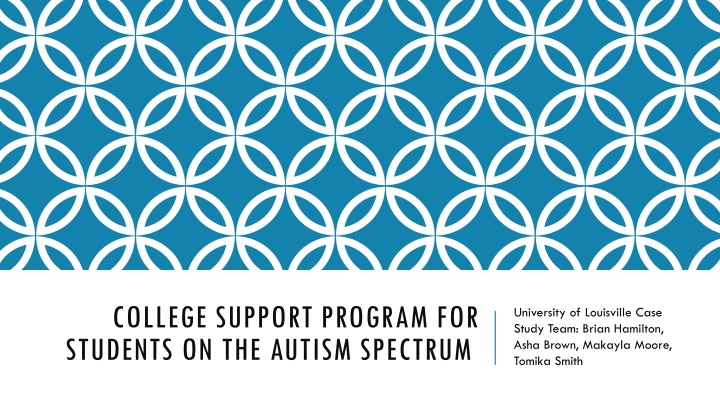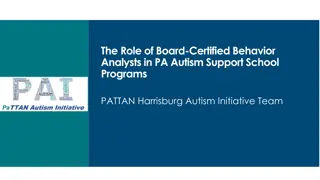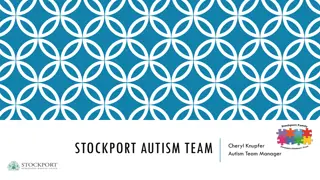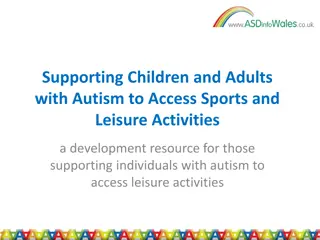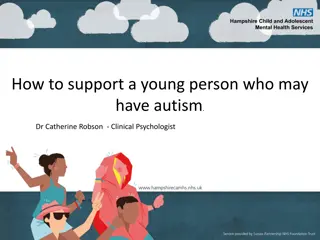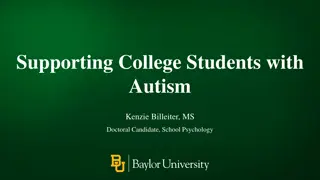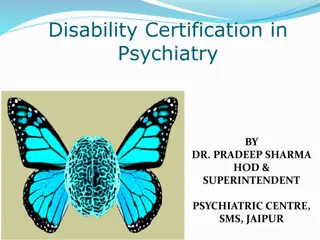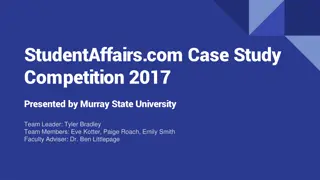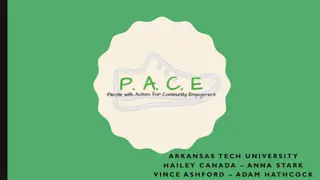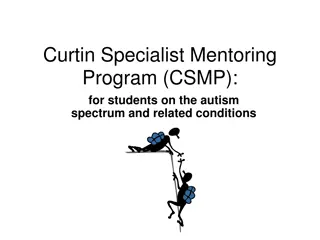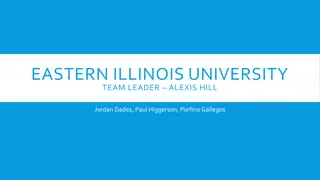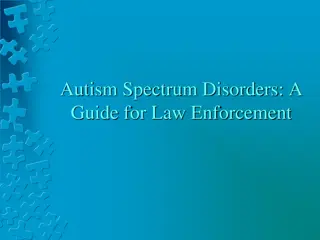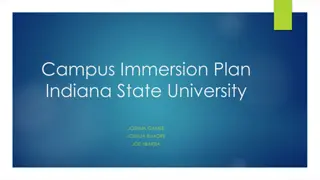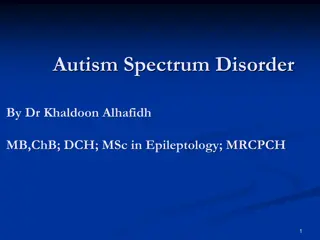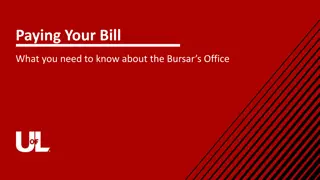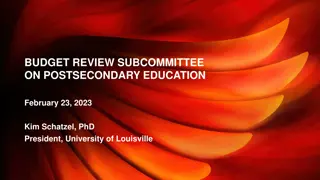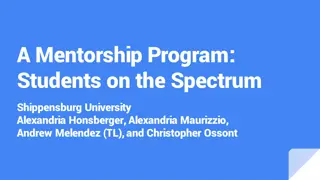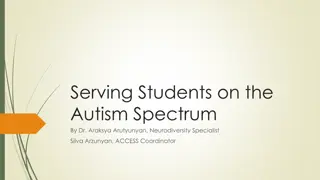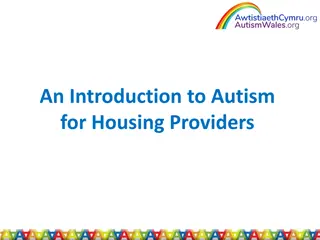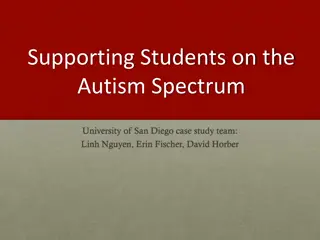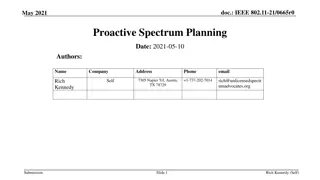College Support Program for Students on the Autism Spectrum - University of Louisville Case Study
Personal Growth, Social Integration, and Academic Assistance are the core goals of the College Support Program for Students on the Autism Spectrum at the University of Louisville. The program aims to assist students in self-discovery, advocacy, and skill development to thrive in their academic journey. Utilizing theories such as Maslow's Hierarchy of Needs and Schlossberg's Transition Theory, the program focuses on holistic support for students with Autism Spectrum Disorders. Through targeted counseling sessions and tailored strategies, students are empowered to achieve personal and academic success.
Download Presentation

Please find below an Image/Link to download the presentation.
The content on the website is provided AS IS for your information and personal use only. It may not be sold, licensed, or shared on other websites without obtaining consent from the author.If you encounter any issues during the download, it is possible that the publisher has removed the file from their server.
You are allowed to download the files provided on this website for personal or commercial use, subject to the condition that they are used lawfully. All files are the property of their respective owners.
The content on the website is provided AS IS for your information and personal use only. It may not be sold, licensed, or shared on other websites without obtaining consent from the author.
E N D
Presentation Transcript
COLLEGE SUPPORT PROGRAM FOR STUDENTS ON THE AUTISM SPECTRUM University of Louisville Case Study Team: Brian Hamilton, Asha Brown, Makayla Moore, Tomika Smith
GOALS AND LEARNING OUTCOMES Personal Growth Counselors will assist students through career assessment, development, and search, raising awareness of self-knowledge and how to advocate for themselves, and developing time and stress management skills. Social Integration Through a mixture of group and individual counseling sessions, students will be supported through activities that promote soft skill acquisition, problem- solving, decision making skill development, and social skills practice. Academic Assistance Individualized strategies designed and implemented to teach students executive functioning skills
PERSONAL GROWTH When considering college success programming for students with Autism Spectrum Disorders, the way in which they develop a sense of self and acclimate to their surroundings must be analyzed. It is important that we help these students continue to learn about themselves, including aspects of their characteristics that may be impacted in transition. We want to build on everyday life skills and foster intrinsic motivation. In highlighting the development of individual skills necessary to navigate college, it is our hope that this summer program will serve as a stepping stone of encouragement. Three areas of growth and individual challenge will be considered: 1. Self-Awareness (who am I and how can I succeed with my disorder) 2. Self-Advocacy (what do I need and how can I communicate those needs) 3. Self-Help (how can I be independent and accomplish my goals)
THEORY #1: MASLOWS HIERARCHY OF NEEDS Using a hierarchy approach to better understand the needs of each individual student. Ultimately, we want participating students to identify who they are and what they need to operate as a member of the campus community without them feeling as though their disorder is a hindrance. As a student affairs professional, focusing on the most basic needs first brings everyday life skills to the forefront. The two areas categorized as basic needs expands on participants learning skills about using their meal plan on campus, living in an on-campus property, navigating throughout campus (to study or go to class), etc. Through personal growth programming, we move into focus on mental and emotional functioning. Our participants will be comfortable in finding their way independently and knowing that campus is somewhere they belong. This incorporates some social integration tools, but mostly identifies their ability to succeed by themselves, knowing that they have support on-campus. Reaching self-actualization places emphasis on advocacy and awareness. It becomes important to have an understanding of themselves and what they would like to achieve, followed by taking the steps to do so.
THEORY #2: SCHLOSSBERGS TRANSITION THEORY As student affairs professionals, we know that transitioning into college and continuing to persist while there can be challenging for all students. With emphasis on students with autism spectrum disorders, we can identify the transitional theory of situation, self, social support, and strategies. Our personal growth goal seeks to uncover ways to make this transition easier. We also want to keep in mind that our students will need assistance in serving themselves. Students in the early arrival summer program are participating in hopes of learning how to conquer academic hardship, as well as increase knowledge about the campus community. Social Support focusing on what their current levels of support may be. This includes a review of family units, how this individual seeks to build relationships (communication barriers both expressive and receptive), and what communities they find comfort in. Situation focusing on the change in educational environment, having to advocate for themselves inside and outside of the classroom, and acknowledging that having an autism spectrum disorder may influence how they experience college. Strategies focusing on what the program can do to aid in the transition period, what skill sets can we build to structure how the participating individuals will succeed after the completion of the program, and how to continue that connection with the student (to ensure unwavering support). Self focusing on personal demographics and characteristics (how does their individual background reflect the way in which their disorder has impacted daily operation or functioning).
THEORY #3: CHICKERINGS THEORY OF IDENTITY DEVELOPMENT Participation in this program supports the development of each student going through the seven vectors of identity development. These seven vectors, also known as tasks , reflect how this program will aid in the psychological development of self and allow students the opportunity to build on self-knowledge. 1. Developing Competence Intellectual & interpersonal competence, physical & manual skills are developed 2. Managing Emotions Recognizes & accepts all emotions; learns how to express and control them 3. Moving Through Autonomy Toward Interdependence Increase in their emotional freedom 4. Developing Mature Interpersonal Relationships Develops intercultural & interpersonal tolerance, appreciate differences (can relate to various difference participants will bring); creates healthy and intimate relationships 5. Establishing Identity Acknowledges differences in identity development based on gender, ethnic background & sexual orientation. Concludes as to who they are and what they represent. 6. Developing Purpose Develop career goals, make commitments to personal interests & activities, establish strong interpersonal commitments; builds on searching and assessing. 7. Developing Integrity Humanize & personalize values, leads towards developing congruence
SOCIAL INTEGRATION The transition to college from high school can be exciting for most students, for students with ASD it can bring on anxiety and trepidation. Difficulties with social and executive functioning can further complicate this transition. Furthermore, students with ASD who persist and continue onto graduation and enter the workforce may experience difficulty integrating into the workforce. The focus areas of social integration for students in the College Support Program will be: 1. Residence Halls 2. Recognized Student Organizations 3. The Workforce
THEORY #4: ASTIN'S THEORY OF INVOLVEMENT Students participating in the College Support Program will transition to the university with four weeks experience living in a residence hall, a peer mentor to assist them, and knowledge of campus resources, and academic preparation. By giving students these tools before, upon, and through their transition to the university, we are better preparing them for lifelong success. Astin's Five Assumptions of Involvement 1. Involvement requires an investment of psychosocial and physical energy. 2. Involvement is continuous, and that the amount of energy invested varies from student to student. 3. Aspects of involvement may be qualitative and quantitative. 4. What a student gains from being involved (or their development) is directly proportional to the extent to which they were involved (in both aspects of quality and quantity). 5. Academic performance is correlated with the student involvement.
ACADEMIC ASSISTANCE To ensure that these students retain from each year to the next and graduate, this program will provide the students with academic assistance using a Montessori approach. Although the Montessori method is usually seen in K-12 classrooms, the ideology behind it can be applied to all students. With academic assistance, the students will learn/be involved in: - study skills - personal/group tutoring - test taking preparation and skills - academic advising
ACADEMIC ASSISTANCE CONT. With the Montessori method, students will be able to have the freedom, within limits, to take the environment provided to them by the instructor and make it fit to their educational needs. Generally, the Montessori method encourages students to be in classes or settings with students of different ages because it mirrors the real world and potential environments. This concept can be reflected in the classroom for these autistic students by integrating other undergraduate and graduate students in their learning experience. They can be there to serve as peer mentors and also co- facilitators of group tutoring sessions.
ACADEMIC ASSISTANCE CONT. Study skills: students will learn note taking strategies, how to balance multiple coursework loads on the collegiate level, how to manage their time in between classes and on the weekends, and how to work collaboratively. Test taking skills: in these sessions, students will be learning methods for test taking that will help alleviate anxiety, manage their time in testing sessions, and effectively answer different question types. Academic advising: students will meet with their academic advisors frequently throughout the semester. Students will be able to choose where they have their advising session and be given the space to lead their session to give them a sense of autonomy. In these sessions, they can plan when they will take their courses and discuss academic and career goals. Here they will be able to make plans and have someone support their goals. Personal/Group tutoring: students will have the opportunity to engage in personalized tutoring with staff from the program. They will also have group sessions where they can help each other with assignments, engage with the peer mentors and begin to apply the study skills they have learned. Students will be able to chose where they have their personal tutoring sessions if they want to be in a space outside of the classroom or other traditional study areas.
CSP COMPONENTS Summer Integration Program (SIP) For four weeks from late July through the end of August, students will move into their rooms on campus early to take a three hour credit General Studies 101 class as an introduction to the university and college academics. The class will be structured with Autism Spectrum Disorder students in mind. During these four weeks students will also participate in additional workshops, field trips, and counseling to facilitate skill development, relationship building, and further integration into the university and community. First Friday Workshops Over the course of the fall semester, students will participate in additional workshops and counseling sessions. These once a month events will give students the opportunity to check in with staff and further practice and develop skills such as stress management, organization, and goal setting. Spring Semester/2nd Year Involvement After the summer early arrival and fall semesters, students are able to continue to meet with counselors as needed throughout the school year. There are also opportunities for them to become peer mentors or student support staff for following summers.
SUMMER INTEGRATION PROGRAM (SIP) The Summer Integration Program (SIP) is comprised of the General Studies 101 course, on and off campus social opportunities, group and individual counseling with peer mentors and professional staff, and workshops. SIP is designed with the aforementioned student development theories in mind. Academic Success - workshops modeling self-advocacy skills, counseling to determine and request reasonable accommodations, identifying strengths, weakness, abilities, and interests, and access to peer and graduate level mentors. Career Development - Provides career assessments, job shadowing opportunities, and appropriate social skills and expectations for the work force. Life Skills teaching skills designed for individuals transitioning into adulthood, collaborating with Housing staff to ensure appropriate housing accommodations are provided, and helping students navigate campus and the community. Leadership & Involvement - group and individual sessions to develop appropriate social skills, emotional intelligence, and grooming expectations, group outings to area events, and other preparations for future student involvement in campus organizations.
FIRST FRIDAY WORKSHOPS First Friday Workshops include: Developing a Social Radar Romantic Relationships Anger Management Life Skills for College Students Career Assessments Developing Executive Functions Stress Management Preparing for Finals
SPRING SEMESTER/2ND YEAR INVOLVEMENT Peer Mentors Starting with their first spring semester, students who participated in the CSP can apply to be peer mentors for students coming into the program for the following year. Peer mentors are trained to work with students with Autism Spectrum Disorder and are required to check in with their mentee regularly over the course of the school year. Mentors are also encouraged to attend the First Friday Workshops. Peer mentors are also required to serve as summer staff for Summer Integration Program. They will serve multiple roles within the Summer Integration Program. Summer staff will chaperone participating students to campus activities and class, facilitate activities and icebreakers, serve as resident assistants for the duration of SIP, and act as mentors for the GEN 101 course.
BUDGET Projected Revenue Revenue Expenses Notes Program fee $50 This fee will cover program supplies. Housing expense $500 All students will move into the open residence hall on the same floor This fee will cover three meals a day at an on-campus buffet. ($25 per day x 28 days=$700) Meals/Food Expense $700 3-hour credit course fee $1,400 This cost is determined by the university's per credit hour fee rates. Revenue Subtotal Per Student $2,650 Each participant would pay this amount in order to enroll into the program. Revenue Subtotal for the Entire Group $53,000 This calculation includes 20 participants
BUDGET Program Staffing Revenue Expenses Notes Program Coordinator $0 This role will be filled by an existing staff member Resident Assistant $0 This role will be filled by an existing residential staff Disability Resource Staff $0 This role will be filled by an existing staff member Peer Mentor $6000The program will employ 5 peer mentor with a $1200 stipend per year Program Subtotal $6,000
BUDGET Summer Integration Program (SIP) Revenue Expenses Notes Housing $10,000 (20 people x $500 residence hall fee= $500) Meals/Food Expense $14,000 (20 people x $700 meal plan= $14000) 3-hour credit course fee $28,000 (20 people x $1400 course fee= $28000) Supplies & Equipment $1,000 This fund will purchase workbooks, binders, pens and printing for the program Each participant and staff member will receive a t-shirt ($15 per tshirt x 30 people= $50) T-shirts $450 First Fridays Activities $1,500 This fund will cover weeks 1-3's Friday outings Banquet expenses: Each Participant will receive a certificate at the completion of the program and we will also purchase a gift for the speaker Awards/Certificates $50 Each Participant will be able to invite up to 3 guest to celebrate with them (this figure budgets food for 75 people) Food/Catering $1,500 Decorations $100 This will cover balloons, centerpieces and table cloths Guest Speaker $0 We hope to have a faculty or staff member volunteer to be the keynote speaker Programming Subtotal $56,600
BUDGET SIP Recognized Student Organization (RSO) Revenue Expenses Notes These funds will supply the RSO with a programming budget for the academic year Programming Budget $1,000 RSO Subtotal $1,000 Total Revenue $53,000 Total Expenses $63,600 Total Budget $10,600
REFERENCES Adreon, D., & Durocher, J. S. (2007). Evaluating the college transition needs of individuals with high-functioning autism spectrum disorders. Intervention in School and Clinic, 42(5), 271-279. Dipeolu, A. O., Storlie, C., & Johnson, C. (2015). College Students With High-Functioning Autism Spectrum Disorder: Best Practices for Successful Transition to the World of Work. Journal Of College Counseling, 18(2), 175-190. doi:10.1002/jocc.12013 Evans, N. J., Forney, D. S., Guido-DiBrito, F. M., Patton, L. D., & Renn, K. A. (2010). Student development in college: Theory, research, and practice. San Francisco: Jossey-Bass. Freedman, S. (2010). Developing College Skills in Students with Autism and Asperger's Syndrome. Jessica Kingsley Publishers. Introduction to Montessori Method. (n.d.). https://amshq.org/Montessori-Education/Introduction- to-Montessori Zager, D., & Alpern, C. S. (2010). College-based inclusion programming for transition-age students with autism. Focus on Autism and Other Developmental Disabilities
